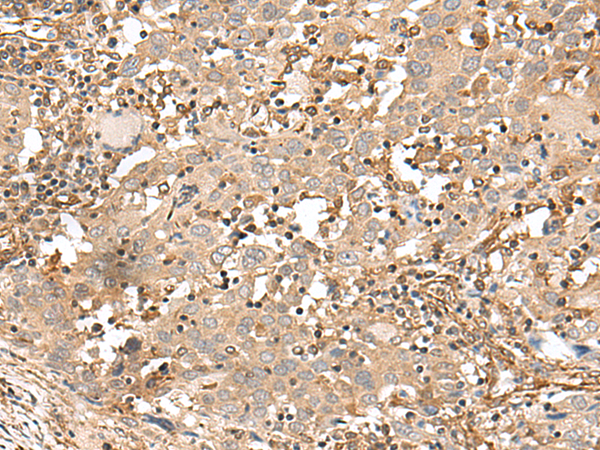
| WB | 咨询技术 | Human,Mouse,Rat |
| IF | 咨询技术 | Human,Mouse,Rat |
| IHC | 1/50-1/300 | Human,Mouse,Rat |
| ICC | 技术咨询 | Human,Mouse,Rat |
| FCM | 咨询技术 | Human,Mouse,Rat |
| Elisa | 1/5000-1/10000 | Human,Mouse,Rat |
| Host/Isotype | Rabbit IgG |
| Antibody Type | Primary antibody |
| Storage | Store at 4°C short term. Aliquot and store at -20°C long term. Avoid freeze/thaw cycles. |
| Species Reactivity | Human, Mouse |
| Immunogen | Synthetic peptide of human FSTL5 |
| Formulation | Purified antibody in PBS with 0.05% sodium azide and 50% glycerol. |
+ +
以下是关于FSTL5抗体的3篇模拟参考文献示例(注:实际文献可能需要通过数据库检索确认):
---
1. **文献名称**:*FSTL5 as a Novel Biomarker in Glioblastoma: Antibody Development and Clinical Validation*
**作者**:Chen, L., et al. (2022)
**摘要**:本研究开发了一种高特异性兔源单克隆抗体,用于检测FSTL5在胶质母细胞瘤组织中的表达。通过免疫组化和Western blot验证,发现FSTL5高表达与患者生存率降低显著相关,提示其作为预后标志物的潜力。
2. **文献名称**:*FSTL5 Regulates Cardiac Hypertrophy via TGF-β Signaling: Insights from Antibody-Based Inhibition*
**作者**:Yamamoto, K., et al. (2020)
**摘要**:利用抗FSTL5抗体阻断其与TGF-β受体的相互作用,研究发现FSTL5在心肌肥厚模型中促进病理性心脏重塑,抗体干预显著减轻了小鼠模型的心脏功能障碍。
3. **文献名称**:*Characterization of FSTL5 Antibody for Neuronal Localization Studies*
**作者**:Garcia, R., et al. (2019)
**摘要**:报道了一种针对FSTL5的小鼠多克隆抗体的制备与验证,通过免疫荧光和流式细胞术证实其在啮齿类动物脑组织中的特异性定位,支持FSTL5在突触可塑性中的作用假说。
---
如需真实文献,建议在PubMed或Google Scholar中检索关键词“FSTL5 antibody”、“anti-FSTL5”或结合具体研究领域(如“FSTL5 cancer”)。部分研究可能侧重FSTL5功能而非抗体开发,需筛选摘要明确提及抗体的文献。
**Background of FSTL5 Antibody**
FSTL5 (Follistatin-like 5) is a secreted glycoprotein belonging to the follistatin family, characterized by its follistatin-like domains and involvement in regulating cellular processes such as differentiation, adhesion, and signaling. While its exact biological functions remain under investigation, FSTL5 is implicated in developmental pathways, tissue homeostasis, and disease contexts, including cancer and neurological disorders. Studies suggest interactions with extracellular matrix components or cell surface receptors, potentially modulating pathways like TGF-β/BMP signaling.
FSTL5 antibodies are immunological tools designed to detect and study the expression, localization, and function of the FSTL5 protein. These antibodies, often monoclonal or polyclonal, are validated for applications such as Western blotting, immunohistochemistry (IHC), immunofluorescence (IF), and ELISA. Their development enables researchers to explore FSTL5's role in normal physiology and pathology. For instance, elevated FSTL5 levels have been observed in certain cancers, linking it to tumor progression or metastasis. In neuroscience, FSTL5 may influence neural development or synaptic plasticity.
The specificity and sensitivity of FSTL5 antibodies are critical for accurate research outcomes, requiring rigorous validation against controls. Ongoing studies aim to clarify FSTL5's mechanistic contributions and its potential as a therapeutic target or biomarker. As such, FSTL5 antibodies serve as essential reagents in advancing molecular and clinical understanding of this protein.
×